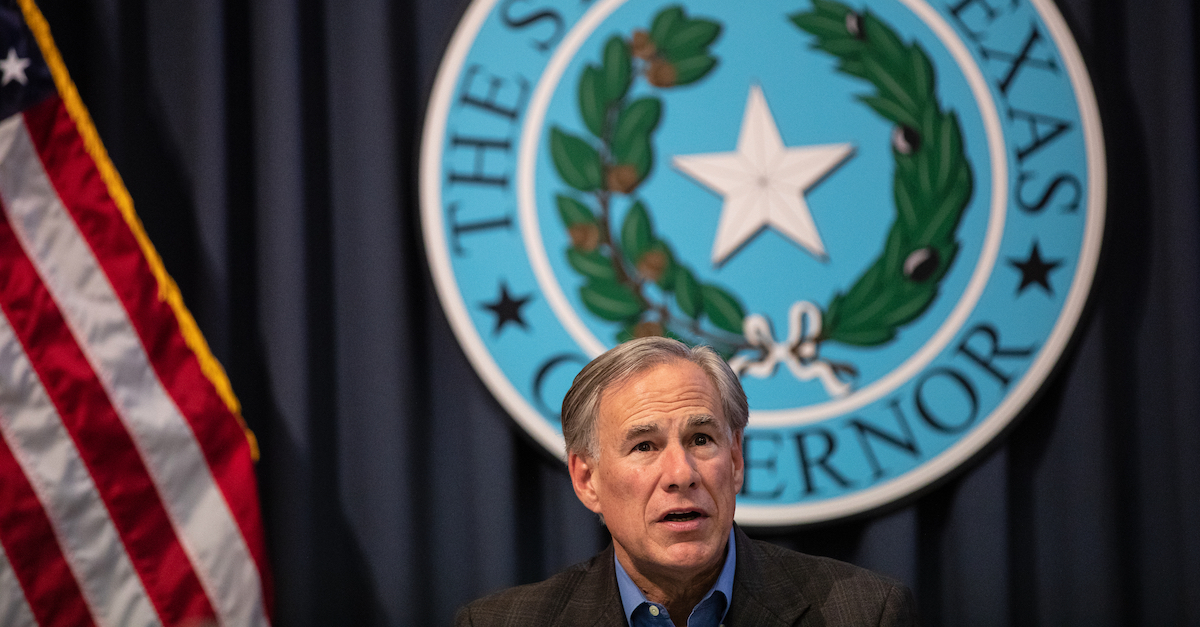
Gov. Greg Abbott speaks during a border security briefing on July 10, 2021, in Austin, Tex.
The U.S. Department of Justice on Friday filed a federal lawsuit against the State of Texas and Gov. Greg Abbott (R) over an executive order this week which banned anyone “other than a federal, state, or local law-enforcement official” from “provid[ing] ground transportation” to any “group of migrants” who had been priorly detained by Customs and Border Protection agents or who had been “subject to expulsion.”
The order also forced officers with the Texas Department of Public Safety “to stop any vehicle upon reasonable suspicion of a violation . . . and to reroute such a vehicle back to its point of origin or a port of entry if a violation is confirmed.” The vehicles used in such conveyances were authorized for impound. Lawyers immediately questioned the order’s constitutionality; the ACLU of Texas called it both “unconstitutional” and “racist.”
The Department of Justice seems to agree — at least in part.
“The executive order violates the Supremacy Clause and causes injury to the United States and to individuals whom the United States is charged to protect, jeopardizing the health and safety of noncitizens in federal custody, risking the safety of federal law enforcement personnel and their families, and exacerbating the spread of COVID-19 in our communities,” the lawsuit begins. “The executive order obstructs the Federal Government’s arrangements with nongovernmental partners and directly interferes with the administration of federal immigration law.”
“This Court should declare the executive order to be invalid and enjoin its enforcement,” the lawsuit continues.
Several scads of paragraphs are then spent recapping the federal regulatory regime which governs immigration. Included were an inventory of lines lauding the federal government’s handling of border crossings: “Congress has provided for the care and well-being of unaccompanied non-citizen children during the pendency of their immigration proceedings.” Then came a incantation of actions the Centers for Disease Control and Prevention took to attempt to curb the spread of COVID at the country’s land crossings:
Section 265 of Title 42 of the United States Code authorizes the Centers for Disease Control and Prevention (CDC) to suspend the introduction into the United States of persons determined by the CDC to increase the danger of the spread of a communicable disease. In light of the COVID-19 pandemic, CDC exercised its Title 42 authority to issue an order in March 2020 temporarily suspending the introduction into the country of certain noncitizens traveling from Canada and Mexico. See 85 Fed. Reg. 17,060 (Mar. 26, 2020). The March 2020 order authorized the expulsion of certain noncitizens to the country from which they entered the United States, their country of origin, or another location as quickly as practicable. Id. at 17,067. In October 2020, CDC issued a new Title 42 order to replace the March 2020 order (as amended and extended). See 85 Fed. Reg. 65,806 (Oct. 16, 2020). Section 268 of Title 42 provides that customs officers within the Department of Homeland Security (DHS) aid in the enforcement of Title 42 orders. On July 16, 2021, CDC issued an order excepting unaccompanied non-citizen children from the October Order. See 86 Fed Reg. 38,717 (July 22, 2021).
What follows is a recitation of precisely why the federal government needs to move detainees and how they’re moved. Citing the use of “federal personnel, contractors, and grantees,” the DOJ explained why the Texas executive order was off point: “Some of the federal personnel who participate in the transport of noncitizens on behalf of the United States in Texas are not ‘law-enforcement official[s]’ in the ordinary sense of the phrase (i.e., officials tasked with enforcing criminal law) — a distinction of potential significance under the new Texas executive order.”
“ICE spends over $200 million annually on contracts with private providers and county governments in Texas for transportation services, covering over 8,000 miles per day,” the lawsuit further explains in the midst of another lengthy analysis of precisely how the federal government says it manages immigration.
Saying that the E.O. “will severely disrupt the Federal Government’s efforts to carry out its responsibilities under the federal immigration laws,” the DOJ alleges that Gov. Abbott’s meddling will cause “backups of unaccompanied children” and “[i]increased density” at immigration facilities — ultimately “endanger[ing] unaccompanied children and facility personnel by increasing the risk of COVID-19 transmission.”
The DOJ argues (1) that federal law preempts the state’s ability to meddle with immigration; and (2) that the Abbott E.O. violates the doctrine of intergovernmental immunity. The feds are asking a judge to (1) declare that the E.O. violates the Supremacy Clause and the doctrine of intergovernmental immunity “and therefore is invalid, null, and void,” (2) preliminary and permanent injunctions against the State of Texas and “its officers, agents and employees” to prevent them from “enforcing the executive order,” (3) to pay the U.S. Government’s costs related to the lawsuit, and (4) any other “just and proper” relief.
The lawsuit was signed by Joshua M. Kolsky of the DOJ’s Civil Division. Also in the signature block are the names of attorneys Zachary A. Avallone, Elliott M. Davis, Stephen Elrich, and Antonia Konkoly. Listed as having “submitted” the document are Acting Assistant Attorney General Brian M. Boynton, Deputy Assistant Attorney General Brian D. Netter, Director of the DOJ’s Federal Programs Branch Alexander K. Haas, and Special Litigation Counsel Jean Lin.
The declarations of officials from Customs and Border Protection, the Department of Homeland Security, and the Department of Health and Human Services are also attached.
The case is assigned to Judge Kathleen Cardone in the Western District of Texas, El Paso division. Cardone is a George W. Bush appointee.
Read the lawsuit, the declarations, and a proposed judge’s order below:
[photo by Tamir Kalifa/Getty Images]
Have a tip we should know? [email protected]